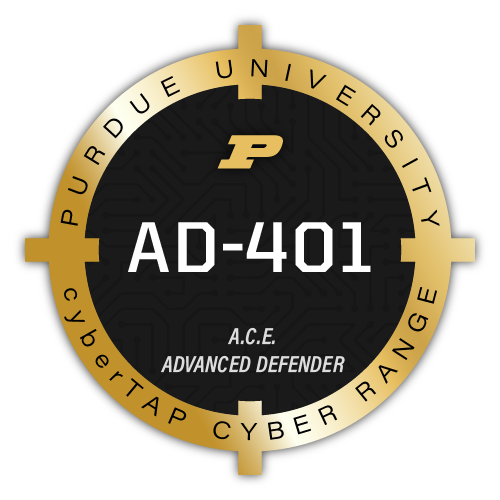
Advanced Defender 401: Individual Security Operations
- Duration: 8 hours
- Delivery Options: Online, In-person
Acting as a skills test, this course allows participants to recognize and respond to three cyber attacks as a solo investigator and responder.
Who should take this course
AD-401 is designed for seasoned cyber and information security professionals looking to challenge their defensive skills. It is recommended that participants have at least three to five years of cybersecurity experience or completed the DEF series.
How can you take this course
Online
Available online live with an instructor
In-person
Available in-person either at Purdue or at your location.
What tools you will use
Participants will use industry tools such as Active Directory, QRadar, Palo Alto Firewalls, Zennos, SysInternals, McAfee EPO, and more.
What you can expect from Advanced Defender 401: Individual Security Operations
AD-401 is a chance for cybersecurity professionals to test their defensive skill solo against three cyberattacks. Each participant will need to spot indicators of compromise, identify cyberattacks, and proceed with mitigation and recovery. The range instructor will provide a debrief with full details and more techniques on how to respond to network attacks.
Key Takeaways
For Organizations:
- Upskill current workforce
- Get hands-on with industry tools in virtual labs.
- Perfect for I.T. leaders
For Individuals:
- Gain an understanding of network traffic.
- Learn industry tools in virtual labs.
- Taught remotely or in-person
Training
Unlike most ACE courses, AD-401 is an individual-focused course. The course is taught through three Purdue Cyber Range scenarios with a debriefing by a range instructor over the course of a day.
Purdue Cyber Range is a virtual testing ground that allows individuals and teams to experience both defensive and offensive cyberattack scenarios. Each scenario is overseen by a Range Master, ensuring your team's experience is as educational as possible.
Course Topics
Advanced Defensive Practices: Understand and explain threat-hunting concepts and techniques, and tools.
Incident Response: Understand advanced methods of identifying, containing, and recovering from a cyber attack within a network.
Adversarial Thinking: Learn how to better identify malware and bad actors by understanding antagonistic thinking.
Tech Requirements
It is recommended that all of cyberTAP courses be taken on a laptop or PC that runs either Windows or Linux as an operating system. We also recommended to have a fast and reliable internet access.
Are you interested in learning more?
cyberTAP's comprehensive approach to teaching cyber fundamentals and building practical skills through applied technical training is perfect for those interested in starting a new career, learning a new skill, experiencing a cyberattack firsthand, or making a team around cybersecurity. Our programs are fully customizable to offer a tailored solution for individual and corporate needs. Let's get in touch and see just how cyberTAP can partner with you and develop a training program just for you and your team.



